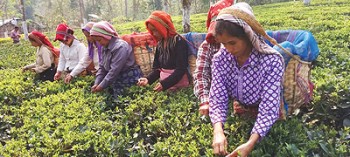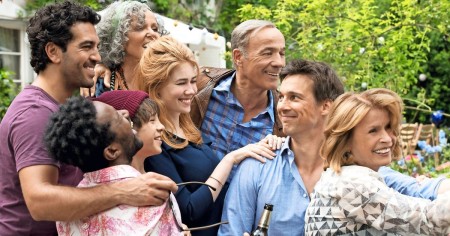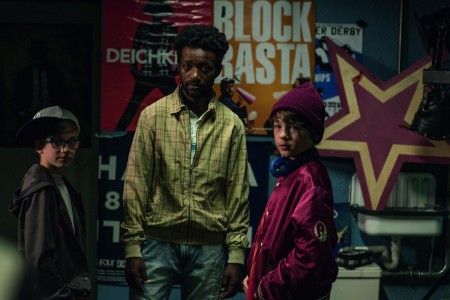-
CODE OF SURVIVAL OR THE END OF GENETIC ENGINEERING (Bertram Verhaag 2017)
BERTRAM VERHAAG; CODE OF SURVIVAL OR THE END OF GENETIC ENGINEERING (2017)

AMBOOTIA TEA PICKERS
Why non-GMO crops are essential for human health and the future of the environment.
Over the last ten-plus years, Bertram Verhaag has made nine films exploring aspects of genetic engineering and, increasingly, the healthy, organic alternatives. The tenth film, Code of Survival – or the End of Genetic Engineering, contrasts sustainable projects in Germany, India and Egypt with the continuing use of GMO farming in the US. Worldwide, millions of tons of the insecticide Roundup, wose active ingredient is glyphosate, are applied to the land year after year. The alarming consequences: poisoned soils, resistant superweeds, contaminated crops and sick livestock. Nonetheless, especially the United States continues to follow this model of GM-agriculture, which impoverishes the crops and makes the soil barren.
As the first US farmer, George Jeffords of Mississippi, tells us, many think they must raise GMO crops using Roundup, that they cannot afford to produce at high volume and low cost by natural methods. Dr. Jane Goodall points out the industry is driven by the profit motive. Obviously, the information we find if we Google this subject is deeply permeated with propaganda from the GMO producers saying that it's okay. The "biggies," Monsanto, Dow, Syngenta, Bayer, Dupont - aren't nice guys. They are vicious invaders of land, dominators of property. How can killing everything in a field except the crop be healthy for the land or for animals and humans?
We hear from Alternative Nobel winner Ibrahim Abouleish of Egypt, his family and coworkers. For four decades his Sekem Farm has used compost to activate microorganisms in desert land and turn it into fertile land. He studied in Austria when he was 20 and returned at 40, where his family has grown up Sekem, an agricultural collective community where the education and whole community are considered as much as the soil.
Ulrich Walter of Lebensbaum is heard from. He buys tea from organic farmers in the Darjeeling region of India who own the Ambootia Tea Group, the largest biometric producers of tea in the world. Women are seen on their knees, and also standing, hand-picking the tea leaves. The Indian family owning and running the farm took some of the farms over in the Eighties when the soil had been ruined by use of chemicals and restored it with compost and careful cultivation. Both this Darjeeling tea farm and the organic farm in Egypt use cow dung in cow horns buried in soil to condition it.
We cringe when the film returns to the US, this time to Idaho, because we think that here Roundup will reign. But instead we hear from Dr. Don Huber, Plant Pathologist, a world authority on GMO's. He explains that genetic engineering has caused plants to be reduced in minerals, and is causing them to be further reduced; our animals are undernourished, and the number of people with autism, gluten intolerance, cancer, etc. is growing. We go to Iowa, where a farmer raised non-GMO and GMO-fed pigs and found how much better the pigs did. Howard Vlieger is an American farmer and agricultural consultant who is a powerful spokesman, like Dr. Huber, for biodiverse and non-GMO agricultural strong spokesman for biodiverse non-GMO agriculture. He explains how the impoverishment of the soil and the crops and the sickening of humans all are good business for the chemical giants whose business is selling treatments and drugs at each end of the cycle.
At the end, Bertram Verhaag explains how lacking scientific aptitude, he nonetheless decided decades ago he decided to focus on making documentaries about genetic engineered plants. He realized he didn't need profound technical knowledge to decide he preferred a natural environment. He convinces the viewer of the validity and urgency of his viewpoint in this powerful film.
Code of Survival or the End of Genetic Engineering, 95 mins., debuted in Germany 1 Jun. 2017. It was screened here as part of the Berlin and Beyond series where it shows Tue. Feb. 13, 2018 6:00pm at Goethe-Institut, San Francisco (the Northern California Premiere).
Last edited by Chris Knipp; 02-07-2018 at 10:24 AM.
-
WELCOME TO GERMANY/ WILLKOMMEN BEI DEN HARTMANNS (Simon Verhoeven 2016)
SIMON VERHOEVEN: WELCOME TO GERMANY/WILLKOMMEN BEI DEN HARTMANNS (2016)

MAIN CAST OF WELCOME TO GERMANY
A comedy that shows how Germany might like to feel about refugees
Welcome to Germany isn't a typical festival film or even a very good film. But it was the most popular locally made film in Germany in 2016 and early 2017. And as such, it shows us what Germans wanted and needed to see. Not surprisingly its main focus is the refugee issue, which it seeks to make manageable and unthreatening. Germany confronts this international crisis more intensely than any other firstworld country: it has seen the arrival of over a million migrants and refugees since the beginning of 2015. The movie looks at this without hiding from how frightening and dangerous it can be. A joyous and silly feel-good picture, Welcome considers even the points of view of those it most disagrees with. That assumes it has a point of view, which isn't always sure. But that doesn't matter. The object of Simon Verhoeven, I think, was to get the issues most troubling to Europeans today out there in palatable form, desensatizing viewers and encouraging dialogue and laughter. If the action is a mess, that's part of the fun - and an aspect of classic comedy, which moves from disorder to reconciliation. Through exposure to an outsider, a family becomes reunited, and through looking at the vast problem on a manageable scale it can envision positive outcomes - one day and one refugee at t time.
To some extent the whole German population comes into play here, but in middlebrow microcosm. The movie's actual title isn't "Welcome to Germany" - that's just for English-speaking viewers. It's Willkommen bei den Hartmanns, "Welcome to the Hartmanns'." The Hartmanns are a well-off Munich family, who adopt an African, Dialo (Eric Kabongo), a Nigerian who lost most of his family to the Boko Haram. His story is tragic, but he himself is more sweet than angry. He speaks in simple, staccato German. He is unfrightening and downright cuddly. We are expected to sympathize with him while also identifying with the crudely exaggerated version of a mainstream German family that struggles to cope with his existence. Kabongo is appealing, but less important than the stars playing the German family. It's been pointed out that the movie poster didn't give Kabongo's name.
The film arrives with good credentials for the popular German audience. It costars as wife Alexandra the veteran actress Senta Berger, a popular star who appeared in the English language pictures Major Dundee and Cast a Giant Shadow in the 1960s. It's directed and was penned by Senta Berger's son, Simon Verhoeven, who's made some silly but financially successful crowd-pleasers before. It has other popular actors. Florian David Fitz, considered a hottie, plays the driven son, Philipp Hartmann, an corporate lawyer whose drive is so intense it comes to seem sheer madness. Indeed he's thrown in the loony bin, but escapes to close his deal in China after all. This is an example of how the film likes to have it both ways: Philipp needs an attitude adjustment, but he's eminently redeemable. Also slated for reformation is Philipp's father, Dr. Richard Hartmann, played by Heiner Lauterbach (winner of awards for movies and TV sitcoms), a highly successful cardiologist. Dr. Hartmann is at midlife crisis (and then some: he looks sixty-ish), much more concerned with trying to indulge in nightlife and getting botox shots than caring for patients, urged into self-empowerment by his hipper contemporary colleague Dr. Heinrich (Uwe Ochsenknecht). LIke his son Phillip, Dr. Hartmann is an example of workaholism: he really just needs to retire and get away and let younger men move ahead, but only a health crisis leads him to take this step.
A traditional chauvinist, Dr. Hartmann scoffs when Alexandra, who has herself just retired from her work as a head teacher, finding herself sipping too often from large glasses of wine as she rattles about in the family's enormous house, now all the emptier with their grown son and daughter away, proposes that the family adopt a refugee from the local settlement center. But he reluctantly gives in, though the official at the center has to make it clear than you don't pick one out like a dog or cat at the pound.
Nonetheless you sort of do. The movie doesn't destroy stereotypes; it works with them to create harmony and good vibes. Dr. Hartman only thinks Dialo's arrival may inconvenience him. When he sees that there is room for the man - who takes over gardening chores and turns into a servant at times (a dubious development the movie never quite questions), he sees that this development only enhances his liberal credentials. Likewise eventually Phillip gets involved in Dialo's cause as a way of throwing his weight around and seeming less materialistic and self-centered for a change.
The existence of xenophobic racism in the society at large is developed through a couple of threads. There is running tension between the Hartmanns and their crucifix-wearing (i.e., anti-muslim) little humorless neighbor with a Polish name, an allusion no doubt to serious problems over refugees with Eastern Europe. More immediately, the Hartmann daughter, Sophie (Palina Rojinski) is rescued from a group of men harassing her in Cologne on New Year's Eve by a racist cab driver who from then on stalks her, reiterating his fears that all multicultural people are dangerous threats. It is he and his oppressive hounding of her and his prejudices that are the threats.
At the refugee center some volunteers act possessive about personal favorites they call "my refugee," while various dressed-up refugees "audition" for a place in the Hartmann household, including families that insist on being taken together while there is a forty-something man who claims to be a minor. The Hartmanns will take only one person, but the movie doesn't entirely mock their lack of ambition, which after all, is only practical. Intelligence corpsmen spy on Dialo after they adopt him, convinced that this innocent little fellow is some kind of Isis mole. Later one of Dialo's roommates turns out actually to have in fact been Isis - so you never can tell, nor have the authorities much of a clue.
Phillip goes nuts, gets to China to negotiate, and still returns in time to plead for Dialo's (threatened) asylum (in reality, only 8% of Nigerian applicants are getting asylum in Germany). Through all the turmoil, perhaps given a sense of proportion about their own easy problems by briefly, vicariously, confronting those of refugees, Alexandra and her husband are reconciled. Sophie gets rid of the nagging cab driver with the xenophobia and crush she does not share. Instead she discovers an old classmate, Dr. Tarek Berger (another pop hearthrob, Elyas M'Barek), her father Dr. Hartmann's associate whom he constantly rejects, a volunteer in group weekly workouts of the refugees who Dialo wants to fix up with her. They find each other instead. (Note how this nods indulgently at traditional matchmaking, while bypassing it.)
The younger generation is represented by the Hartmanns' preteen grandson Basti (Marinus Hohmann), who enlists Dialo in his precocious rap and hip hop schemes, which involve, of course, drugs, trash talk, and obscenity, though he is only a kid, and a kind of complicity develoops. This subplot suggests that there is a bond that can develop between new arrivals and the younger generation that bypasses conventional prejudices and stereotypes.
We may roll our eyes at the simplifications here, while still falling a little for the charm.
Reviewed as part of the Berlin and Beyond festival, San Francisco, where it's showing Fri. Feb. 9, 2018 at 6:30 PM at the Castro Theatre,
Northern California Premiere - Opening Night Film
In Person: Simon Verhoeven
Also:
Mon. Feb. 12, 2018 at 7:00 PM
Shattuck CInemas, Berkeley
Special Encore

ERIK KABONGO (CENTER), MARINUS HOHMANN (RIGHT) IN WELCOME TO GERMANMY
Last edited by Chris Knipp; 02-12-2018 at 11:05 PM.
 Posting Permissions
Posting Permissions
- You may not post new threads
- You may not post replies
- You may not post attachments
- You may not edit your posts
-
Forum Rules





 Reply With Quote
Reply With Quote


Bookmarks